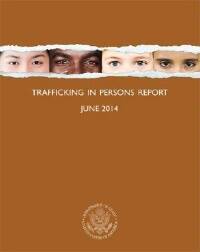The Republic of Haiti, for the first time in 215 years, has finally instituted a law that bans the enslavement of other human beings. Chad has begun taking firm action against the forcing of children into militia groups. Switzerland, in similar developments, had finally closed a legal loophole that, until recently, permitted the prostitution of children. In contrast from these overtly positive developments, the annual Trafficking in Persons Report, compiled by the State Department in accordance with congressional mandates, paints the darker side of human trafficking just as clearly. In this years report, Venezuela, Thailand and Malaysia were all victims of the Congressional auto-downgrade, which requires that any country that remains on the Tier 2 watch-list level, being the tier in which some effort is noticed yet there is little recognition for further work to be done, for a certain number of years be re-categorized as a Tier 3, the lowest level and meant for countries that fail to meet even the most basic of criteria in combatting human trafficking. Countries such as Mauritania, Russia, Cuba, Uzbekistan, Syria, and several others, 23 in all, were considered to be at a Tier 3 level, with human trafficking rampant in feeding the prevalent sex slavery, drug trafficking and forced labor plaguing each of those countries.
The report, released on June 20 by Secretary of State John Kerry, provides some interesting insights as to what exactly is being done in regards to not only combatting human trafficking, but also in helping the victims through identification, care and the prosecution of the traffickers who aid in the existence of this annually-grossing $150 billion black market economy.
The important thing to note is that progress seems to be being made. Between then release of the 2013 and 2014 reports, there was an 82% increase in convictions for human trafficking worldwide, or roughly 1,030 more convictions than the previous year. Fifty-eight different pieces of legislation specifically focused on combatting trafficking and protecting human dignity were passed worldwide, again surpassing the previous year by 37. The one anomaly, which may either provide great relief or prove very concerning, is that the number of victims identified has decreased. In the 2013 report, 46,570 persons were identified as victims of trafficking. In the 2014 report, the number declines by 3.9%, falling to 44,578 victims identified. This drop in victims identified may be due to a decrease in trafficking as a result of the various legislative measures that have been passed in the previous years; or, it could be a much more devastating sign that the traffickers are finding ways around the new legislation. Either way, these identifications are just a drop in the bucket of the estimated 20 million persons who suffer as a result from trafficking.
What proves most interesting about the report are the self-criticisms and the recognition of failures on the part of the United States. It is clearly recognized that Tier 1 countries, such as the U.S., have a long way to go in eradicating human trafficking. While the number of Americans trafficked is relatively small when compared to South East Asia or Eastern Europe, the United States still plays a major role in affecting economies that may see a need to promote human trafficking based on market demands. Some of these include cheap products from markets in South East Asia that spawn slave labor in sweatshops; others may include the demand for prostitutes and the kidnapping or selling of young women to fulfill these illicit needs and wants of the market. Still, other market demands call for cheap agriculture and aquaculture, which leads to slave like conditions on farms and shipping vessels.
What is also quite interesting and good to see is a heavy emphasis in the report on differentiating victims and traffickers, and creating support systems for trafficking victims and furthering prosecutions and convictions of the perpetrators. It is heartening to see a greater concern for those who are victimized and that there is a recognition that the acts they commit are often not under their own volition; a recognition that takes note of the physical, emotional and psychological damage afflicted on these individuals not by their own choices, but by endemic and systematic factors of corruption in the markets and in society. The main objectives of the United States, enumerated in the report, include:
- Increase funding for relevant agencies to provide comprehensive victim services both domestically and internationally;
- Collaborate with survivors to improve programs, policies, strategies, and materials; ensure transparency in the implementation of the strategic action plan on victim services in the United States;
- Strengthen interagency coordination on survivor engagement, training, shared terminology, and data collection;
- Enhance the training of law enforcement and prosecutors to increase focus on labor trafficking;
- Strengthen prevention efforts, including addressing the demand for forced labor and commercial sex;
- Encourage state and local officials to adopt victim-centered policies that prohibit prosecuting victims for crimes committed as a direct result of being trafficked;
- Increase training on indicators of human trafficking and the victim-centered approach for criminal and juvenile justice officials, family court officials, labor inspectors, health care professionals, social service and child welfare entities, emergency call operators, and other first responders;
- Explore technology solutions to combat human trafficking.
While the U.S. and the 30 other nations on the Tier 1 list appear to have trafficking under control, for the most part, it is also there duty to influence market structures that they partake in so as to further stall the demandfor human trafficking to fulfill those market needs. This is where the real issues lies: most trafficking takes place because there is a demand for it, which means somewhere along the line one human is making a demand upon the market that can be met by reducing another human being to a means rather than an end within themselves. Pope Francis is even quoted in this year’s report, having stated “I exhort the international community to adopt an even more unanimous and effective strategy against human trafficking, so that in every part of the world, men and women may no longer be used as a means to an end.” It does not matter how much work we put into developing victim identification, prosecution of traffickers or rehabilitation of victims if we don’t change the societal demands that create these situations in which an individual views it as worth the risk and to their economic benefit to enslave another human person.
The innate dignity rendered to the individual is what makes us all the same: We are not to be simply separated as Masters and Slaves, before each other or before God, but rather viewed a humans bound in a singular journey, seeking mutual salvation. The very essence of the human person seeks to love and to be loved, and there are few violations of this essence greater than the travesty of human trafficking. We each need to look at the world and see how we can make it a little more just, and putting an end to the enslavement of the vulnerable and poor would be a radical first step.








